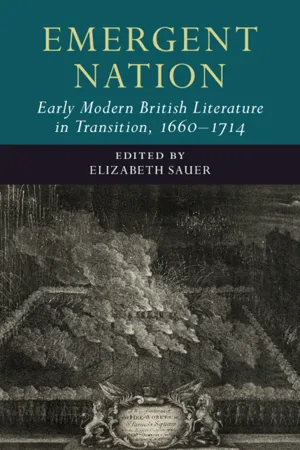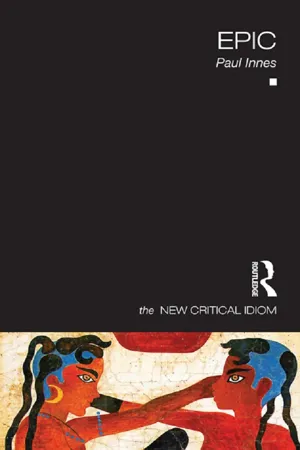Literature
Mock Epic
A mock epic is a literary genre that parodies the conventions of classical epic poetry by applying them to trivial or mundane subjects. It often uses grandiose language and exaggerated heroic themes to highlight the absurdity of the subject matter. Mock epics are known for their satirical and humorous treatment of everyday events, making them a popular form of literary satire.
Written by Perlego with AI-assistance
Related key terms
1 of 5
3 Key excerpts on "Mock Epic"
- Elizabeth Sauer(Author)
- 2019(Publication Date)
- Cambridge University Press(Publisher)
The latter supplied both a mechanism for the reading public to converse with itself – as in John Dunton’s Athenian Mercury – and a virtual person – Mr. Spectator – who promised to diffuse the social, political, and religious tensions of a diverse nation by cultivating tasteful subjects (see chapter 1 by Denise Gigante). Many of the other chapters in this volume also take up these developments, tracing different stories of the afterlife of epic by identifying some of the new tools forged by an emergent nation for representing and celebrating itself. Further Reading Claude Rawson, “Mock-Heroic and English Poetry,” in The Cambridge Companion to the Epic, ed. Catherine Bates (Cambridge: Cambridge University Press, 2010), 167–92. Claude Rawson, “War and the Epic Mania in England and France: Milton, Boileau, Prior and English Mock-Heroic,” Review of English Studies, n.s. 64.265 (2012): 433–53. Richard Terry, “Epic and Mock-Heroic,” in A Companion to Eighteenth-Century Poetry, ed. Christine Gerrard (Malden, MA: Wiley Blackwell, 2006), 356–68. Richard Terry, Mock Heroic from Butler to Cowper: An English Genre and Discourse (Aldershot: Ashgate, 2005). Anthony Welch, “Paradise Lost and English Mock Heroic,” in Milton in the Long Restoration, ed. Blair Hoxby and Ann Baynes Coiro (Oxford: Oxford University Press, 2016), 465–82. “Familiar Things … Made New” 55 chapter 3 The Satiric Contract David Rosen and Aaron Santesso It is surely significant that, in the Preface to the most original (and greatest) English-language satire of the late seventeenth century, the narrator felt the need to explain what he was not writing: satire. ’Tis a great Ease to my Conscience that I have writ so elaborate and useful a Discourse without one grain of Satyr intermixt; which is the sole point wherein I have taken leave from the famous originals of our age and Country.- eBook - PDF
- Frederick Jones, David Taylor(Authors)
- 2007(Publication Date)
- Bristol Classical Press(Publisher)
All these features can be seen in (and mark) satiric uses of epic colour. Mannerisms such as the invocation of the Muse, formulaic ways of introducing and closing speech, 8 and the formal descriptive figure known as the ecphrasis 9 might be mentioned here, of which the first two are parodied by satirists. Among the satirists Juvenal’s fourth satire shows perhaps the most persistent use of the epic manner and on the largest scale (although one might also mention Hor. Sat. 2.5, the dialogue between Tiresias and Ulysses). 10 In the poetry of the satirists this loftier style always stands out as different. In its new context the style reveals itself, as it were, as somehow inappropriate for the world of experience: it becomes absurd, or appro-96 Juvenal and the Satiric Genre priate only in an ironic sense. This viewpoint is shared by epigram, and generally by Catullus’ polymetric corpus. The situation is different in other poetric genres. These tend in varying degrees towards greater eleva-tion of language; stylistic features which would stand out in satire do not necessarily do so in lyric or elegy, 11 or in didactic, tragedy, or Statius’ Silvae, or even in bucolic (despite its affirmation of lowliness: V. Ecl . 6.5, 8, 10). Rather, the loftier mannerisms we find in those genres are parts of a poetic language which is to some extent held in common. ‘Typical’ epic content As well as style there is content. For us one of the core features of classical epics (and parodies, such as the Batrachomyomachia, ‘The Battle of the Frogs and Mice’) is the centrality of war. We have already seen how it is particularly characteristic of elegy to present epic as having war as its chief concern, typically in the recusatio , and to make this the basis of a sort of ideological antagonism. We have also seen how satire, equally antago-nistic to epic, concentrates rather on its unrealism. - Chapter 2 . However, in a society in which one very large social class rises to prominence, the epic requires to be adapted in such a way as to emphasise the emergence of ‘novel’ social forces that require their own distinct narratives. In this way, the focus on an emerging literary form was calculated to produce a supposedly more ‘realistic’ representation of experience. It is this that allows for a distance to be created between the adoption of a mock heroic style and ‘real life’ where there is a gap (as in Pope and Fielding) between the style of representation and a much more tawdry ‘reality’. The realist novel arises when the narrative focuses on the quotidian private lives and psychological motives of ordinary individuals as distinct from the community, as a consequence of the growing distinction between private and public spheres. In this way the novel becomes more documentary and descriptive, and accordingly the ‘epic’ elements begin to drain away except that in so far as they function as a marker of cultural and social status they are retained by a social class that uses them to validate its power and position. Fielding used his mockery of the pretensions of epic to prick the delusions of an upper class that deluded itself into thinking that it lived life at the level of epic, and after him the ‘epic’ novel becomes more and more the form that speaks for a rising class, rather than being deployed as an instrument of ridicule.The novel continues through this literary and historical process into movements such as Modernism, and with multiple variations. Peter Childs offers an account of the internal discussion among novelists about the novel form in his book Modernism (Childs 2008: 80–90), where he describes how Modernist writers self-consciously reacted against their realist predecessors, especially in terms of technique. Many of these writers used classical allusion, but the movement with which they became associated went one step further. According to Childs, for example, it is possible to read James Joyce’s Modernist novel Ulysses (published in its entirety 1922, the same year as T.S. Eliot’s poem The Waste Land) without knowing a great deal about its deployment of episodes from Homer’s Odyssey (Childs 2008: 214–16). As we saw earlier, this is reminiscent of possible responses to romance and epic such as those that appeared in the writings of Rabelais and Cervantes, although the way these motifs are managed in the earlier texts partially obscures a powerful initiatory moment in prose writing. Joyce, however, extends this practice in such a way that a full appreciation of his novel (as indeed with Rabelais and Cervantes) depends upon a whole series of intertextual encounters with Homer, as can be seen in the following example from Ulysses:
Index pages curate the most relevant extracts from our library of academic textbooks. They’ve been created using an in-house natural language model (NLM), each adding context and meaning to key research topics.


